Organisational Behaviour Analysis Report: Sainsbury Plc
VerifiedAdded on 2023/01/19
|15
|5168
|37
Report
AI Summary
This report provides an analysis of organisational behaviour within Sainsbury Plc, a major UK supermarket chain. It examines the influence of culture, power, and politics on individual and team behaviour and performance, as well as the impact of employee motivation. The report explores the concepts of organisational culture, including power, task, person, and role cultures, and their effects on employee satisfaction and involvement. It also delves into the role of organisational politics, its various forms, and its impact on employee demotivation and productivity. Furthermore, the report discusses different types of power within the organisation, such as legitimate, reward, referent, informational, and expert power, and how these are used by managers to influence employee behaviour. The assessment also covers process and content theories of motivation, and how they attain goals and objectives of an organisation. Finally, the report discusses factors that make a team effective and ineffective, as well as the application of organisational behaviour concepts in the context of Sainsbury, exploring how various philosophies and concepts influence behaviour in both positive and negative ways. The report concludes by emphasizing the importance of positive organisational culture, effective leadership, and employee motivation for achieving Sainsbury's business goals.
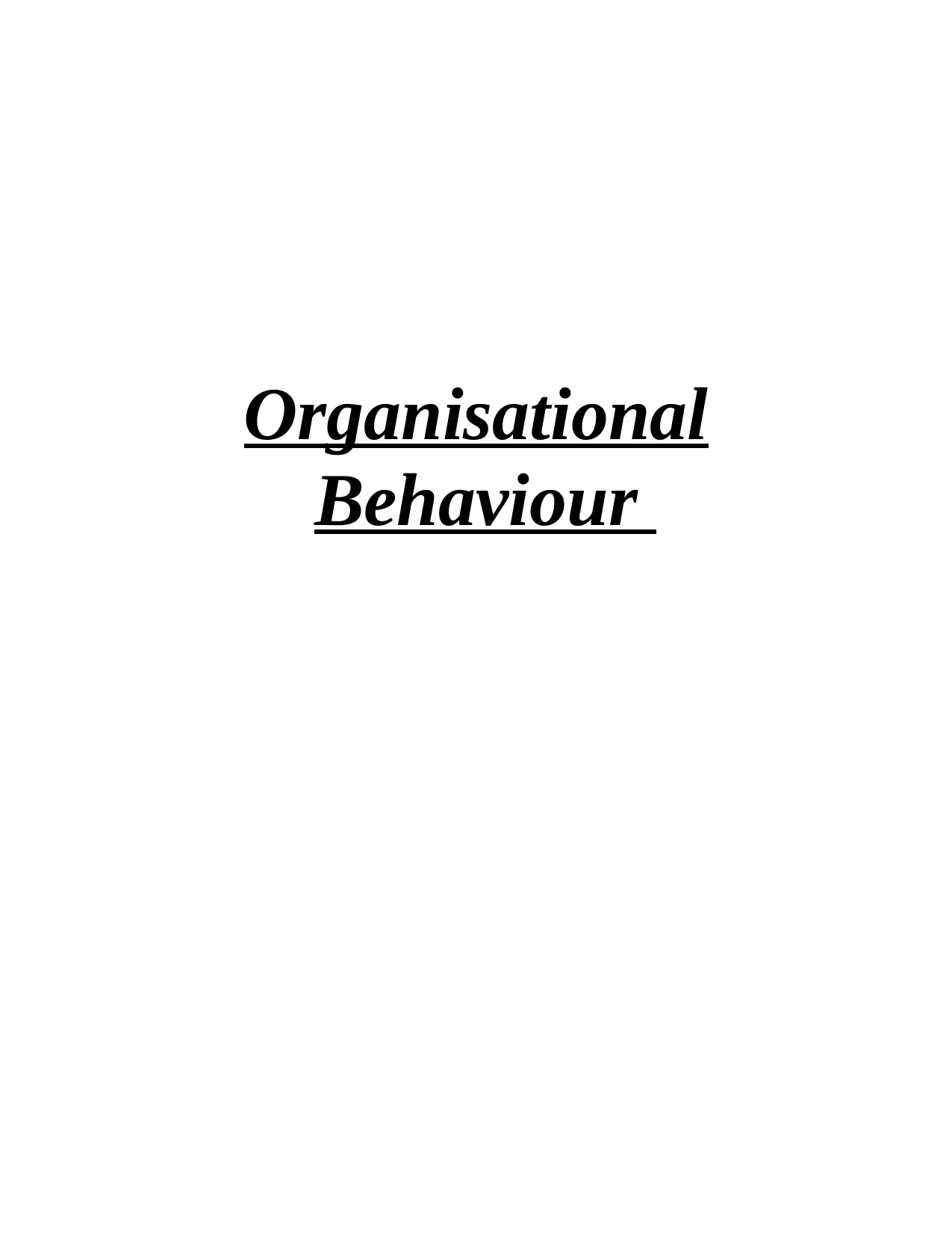
Organisational
Behaviour
Behaviour
Paraphrase This Document
Need a fresh take? Get an instant paraphrase of this document with our AI Paraphraser
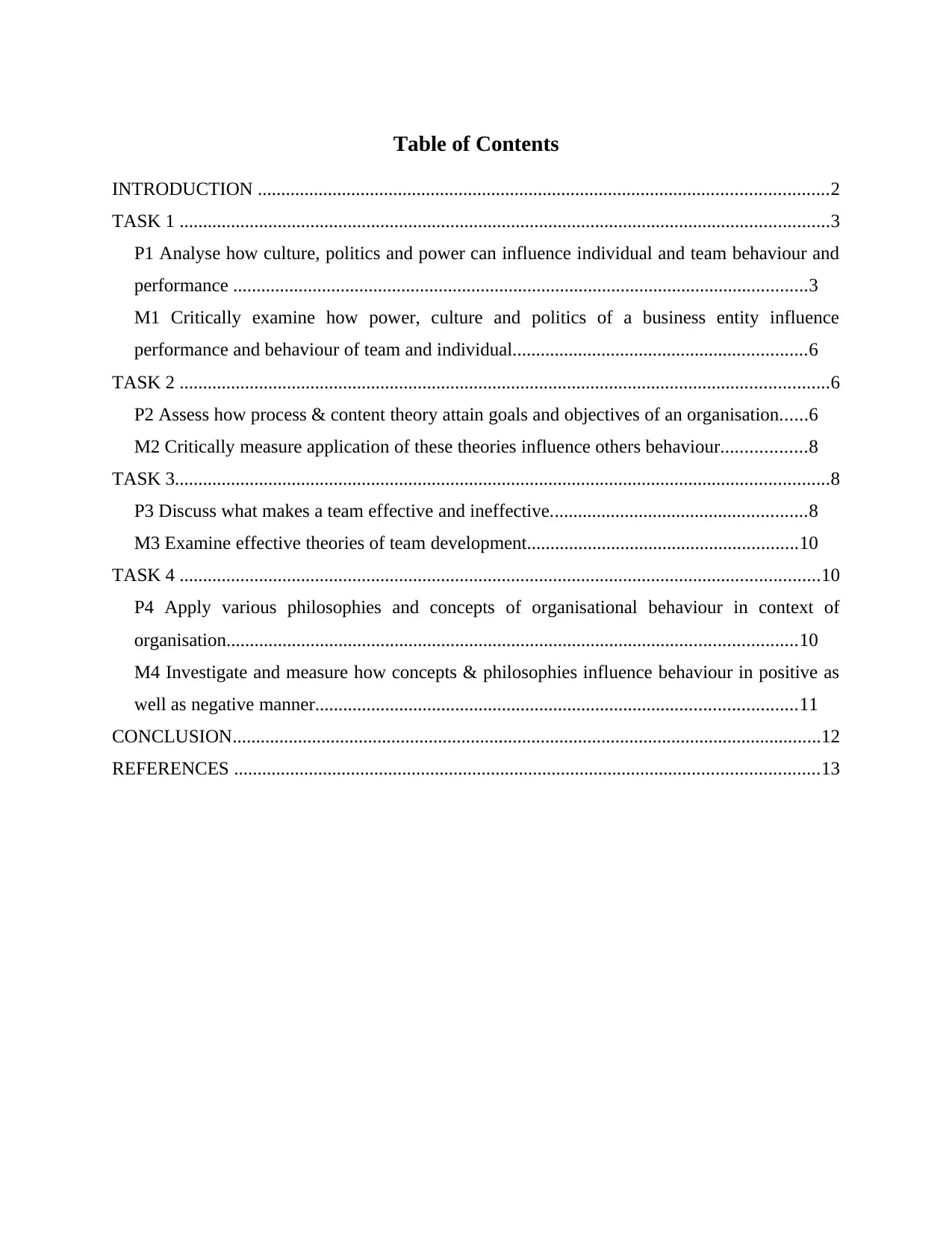
Table of Contents
INTRODUCTION ..........................................................................................................................2
TASK 1 ...........................................................................................................................................3
P1 Analyse how culture, politics and power can influence individual and team behaviour and
performance ...........................................................................................................................3
M1 Critically examine how power, culture and politics of a business entity influence
performance and behaviour of team and individual...............................................................6
TASK 2 ...........................................................................................................................................6
P2 Assess how process & content theory attain goals and objectives of an organisation......6
M2 Critically measure application of these theories influence others behaviour..................8
TASK 3............................................................................................................................................8
P3 Discuss what makes a team effective and ineffective.......................................................8
M3 Examine effective theories of team development..........................................................10
TASK 4 .........................................................................................................................................10
P4 Apply various philosophies and concepts of organisational behaviour in context of
organisation..........................................................................................................................10
M4 Investigate and measure how concepts & philosophies influence behaviour in positive as
well as negative manner.......................................................................................................11
CONCLUSION..............................................................................................................................12
REFERENCES .............................................................................................................................13
INTRODUCTION ..........................................................................................................................2
TASK 1 ...........................................................................................................................................3
P1 Analyse how culture, politics and power can influence individual and team behaviour and
performance ...........................................................................................................................3
M1 Critically examine how power, culture and politics of a business entity influence
performance and behaviour of team and individual...............................................................6
TASK 2 ...........................................................................................................................................6
P2 Assess how process & content theory attain goals and objectives of an organisation......6
M2 Critically measure application of these theories influence others behaviour..................8
TASK 3............................................................................................................................................8
P3 Discuss what makes a team effective and ineffective.......................................................8
M3 Examine effective theories of team development..........................................................10
TASK 4 .........................................................................................................................................10
P4 Apply various philosophies and concepts of organisational behaviour in context of
organisation..........................................................................................................................10
M4 Investigate and measure how concepts & philosophies influence behaviour in positive as
well as negative manner.......................................................................................................11
CONCLUSION..............................................................................................................................12
REFERENCES .............................................................................................................................13
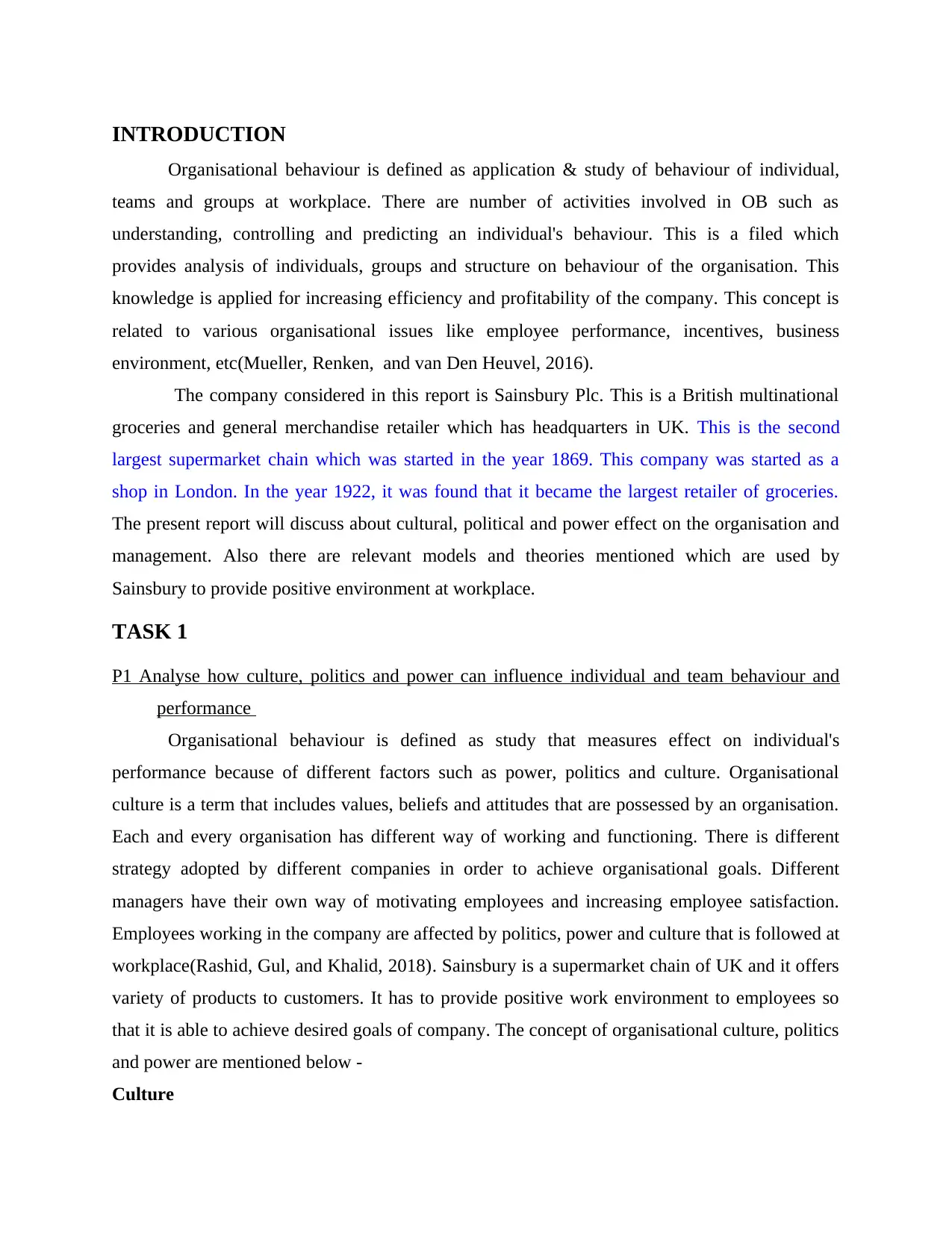
INTRODUCTION
Organisational behaviour is defined as application & study of behaviour of individual,
teams and groups at workplace. There are number of activities involved in OB such as
understanding, controlling and predicting an individual's behaviour. This is a filed which
provides analysis of individuals, groups and structure on behaviour of the organisation. This
knowledge is applied for increasing efficiency and profitability of the company. This concept is
related to various organisational issues like employee performance, incentives, business
environment, etc(Mueller, Renken, and van Den Heuvel, 2016).
The company considered in this report is Sainsbury Plc. This is a British multinational
groceries and general merchandise retailer which has headquarters in UK. This is the second
largest supermarket chain which was started in the year 1869. This company was started as a
shop in London. In the year 1922, it was found that it became the largest retailer of groceries.
The present report will discuss about cultural, political and power effect on the organisation and
management. Also there are relevant models and theories mentioned which are used by
Sainsbury to provide positive environment at workplace.
TASK 1
P1 Analyse how culture, politics and power can influence individual and team behaviour and
performance
Organisational behaviour is defined as study that measures effect on individual's
performance because of different factors such as power, politics and culture. Organisational
culture is a term that includes values, beliefs and attitudes that are possessed by an organisation.
Each and every organisation has different way of working and functioning. There is different
strategy adopted by different companies in order to achieve organisational goals. Different
managers have their own way of motivating employees and increasing employee satisfaction.
Employees working in the company are affected by politics, power and culture that is followed at
workplace(Rashid, Gul, and Khalid, 2018). Sainsbury is a supermarket chain of UK and it offers
variety of products to customers. It has to provide positive work environment to employees so
that it is able to achieve desired goals of company. The concept of organisational culture, politics
and power are mentioned below -
Culture
Organisational behaviour is defined as application & study of behaviour of individual,
teams and groups at workplace. There are number of activities involved in OB such as
understanding, controlling and predicting an individual's behaviour. This is a filed which
provides analysis of individuals, groups and structure on behaviour of the organisation. This
knowledge is applied for increasing efficiency and profitability of the company. This concept is
related to various organisational issues like employee performance, incentives, business
environment, etc(Mueller, Renken, and van Den Heuvel, 2016).
The company considered in this report is Sainsbury Plc. This is a British multinational
groceries and general merchandise retailer which has headquarters in UK. This is the second
largest supermarket chain which was started in the year 1869. This company was started as a
shop in London. In the year 1922, it was found that it became the largest retailer of groceries.
The present report will discuss about cultural, political and power effect on the organisation and
management. Also there are relevant models and theories mentioned which are used by
Sainsbury to provide positive environment at workplace.
TASK 1
P1 Analyse how culture, politics and power can influence individual and team behaviour and
performance
Organisational behaviour is defined as study that measures effect on individual's
performance because of different factors such as power, politics and culture. Organisational
culture is a term that includes values, beliefs and attitudes that are possessed by an organisation.
Each and every organisation has different way of working and functioning. There is different
strategy adopted by different companies in order to achieve organisational goals. Different
managers have their own way of motivating employees and increasing employee satisfaction.
Employees working in the company are affected by politics, power and culture that is followed at
workplace(Rashid, Gul, and Khalid, 2018). Sainsbury is a supermarket chain of UK and it offers
variety of products to customers. It has to provide positive work environment to employees so
that it is able to achieve desired goals of company. The concept of organisational culture, politics
and power are mentioned below -
Culture
⊘ This is a preview!⊘
Do you want full access?
Subscribe today to unlock all pages.

Trusted by 1+ million students worldwide
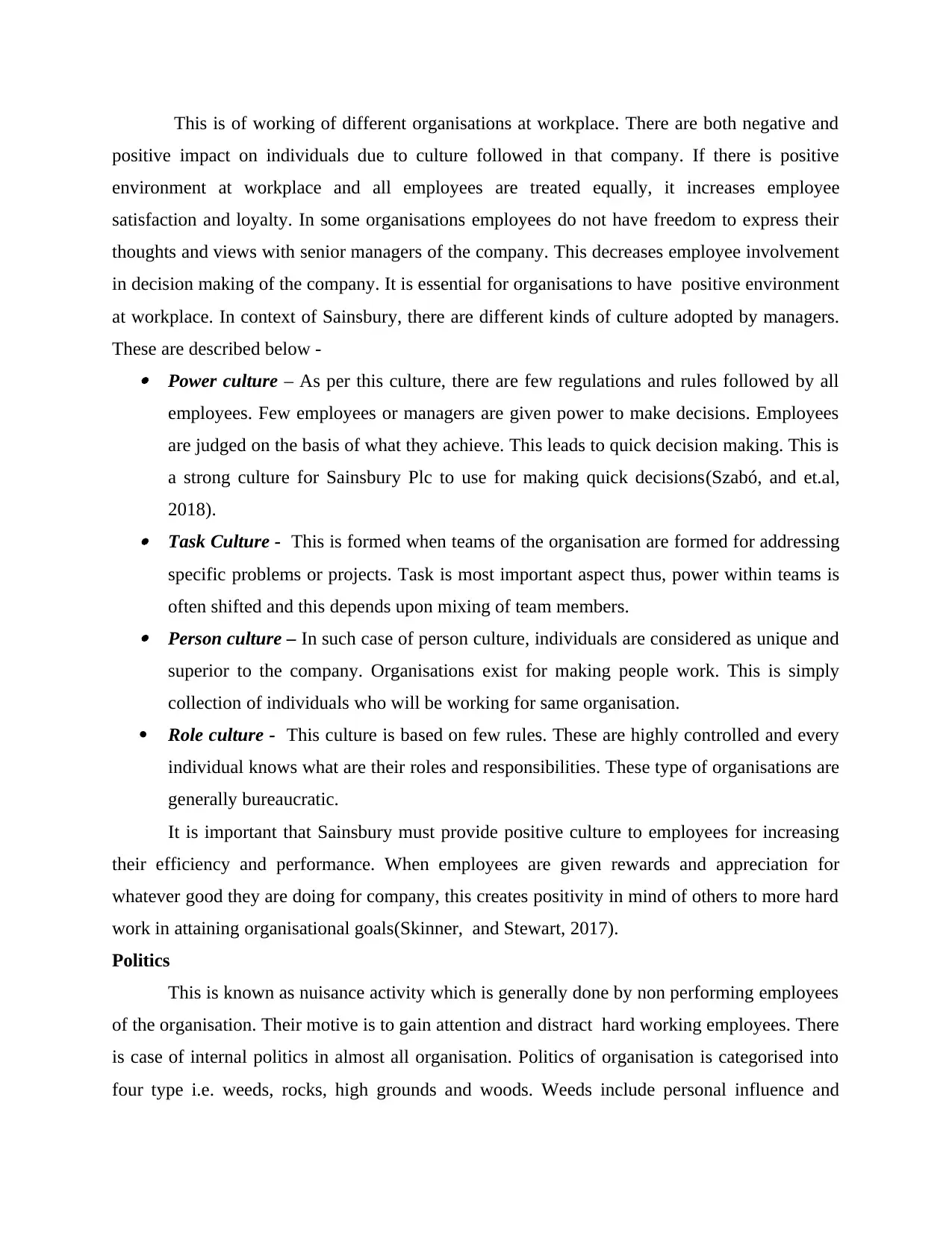
This is of working of different organisations at workplace. There are both negative and
positive impact on individuals due to culture followed in that company. If there is positive
environment at workplace and all employees are treated equally, it increases employee
satisfaction and loyalty. In some organisations employees do not have freedom to express their
thoughts and views with senior managers of the company. This decreases employee involvement
in decision making of the company. It is essential for organisations to have positive environment
at workplace. In context of Sainsbury, there are different kinds of culture adopted by managers.
These are described below - Power culture – As per this culture, there are few regulations and rules followed by all
employees. Few employees or managers are given power to make decisions. Employees
are judged on the basis of what they achieve. This leads to quick decision making. This is
a strong culture for Sainsbury Plc to use for making quick decisions(Szabó, and et.al,
2018). Task Culture - This is formed when teams of the organisation are formed for addressing
specific problems or projects. Task is most important aspect thus, power within teams is
often shifted and this depends upon mixing of team members. Person culture – In such case of person culture, individuals are considered as unique and
superior to the company. Organisations exist for making people work. This is simply
collection of individuals who will be working for same organisation.
Role culture - This culture is based on few rules. These are highly controlled and every
individual knows what are their roles and responsibilities. These type of organisations are
generally bureaucratic.
It is important that Sainsbury must provide positive culture to employees for increasing
their efficiency and performance. When employees are given rewards and appreciation for
whatever good they are doing for company, this creates positivity in mind of others to more hard
work in attaining organisational goals(Skinner, and Stewart, 2017).
Politics
This is known as nuisance activity which is generally done by non performing employees
of the organisation. Their motive is to gain attention and distract hard working employees. There
is case of internal politics in almost all organisation. Politics of organisation is categorised into
four type i.e. weeds, rocks, high grounds and woods. Weeds include personal influence and
positive impact on individuals due to culture followed in that company. If there is positive
environment at workplace and all employees are treated equally, it increases employee
satisfaction and loyalty. In some organisations employees do not have freedom to express their
thoughts and views with senior managers of the company. This decreases employee involvement
in decision making of the company. It is essential for organisations to have positive environment
at workplace. In context of Sainsbury, there are different kinds of culture adopted by managers.
These are described below - Power culture – As per this culture, there are few regulations and rules followed by all
employees. Few employees or managers are given power to make decisions. Employees
are judged on the basis of what they achieve. This leads to quick decision making. This is
a strong culture for Sainsbury Plc to use for making quick decisions(Szabó, and et.al,
2018). Task Culture - This is formed when teams of the organisation are formed for addressing
specific problems or projects. Task is most important aspect thus, power within teams is
often shifted and this depends upon mixing of team members. Person culture – In such case of person culture, individuals are considered as unique and
superior to the company. Organisations exist for making people work. This is simply
collection of individuals who will be working for same organisation.
Role culture - This culture is based on few rules. These are highly controlled and every
individual knows what are their roles and responsibilities. These type of organisations are
generally bureaucratic.
It is important that Sainsbury must provide positive culture to employees for increasing
their efficiency and performance. When employees are given rewards and appreciation for
whatever good they are doing for company, this creates positivity in mind of others to more hard
work in attaining organisational goals(Skinner, and Stewart, 2017).
Politics
This is known as nuisance activity which is generally done by non performing employees
of the organisation. Their motive is to gain attention and distract hard working employees. There
is case of internal politics in almost all organisation. Politics of organisation is categorised into
four type i.e. weeds, rocks, high grounds and woods. Weeds include personal influence and
Paraphrase This Document
Need a fresh take? Get an instant paraphrase of this document with our AI Paraphraser
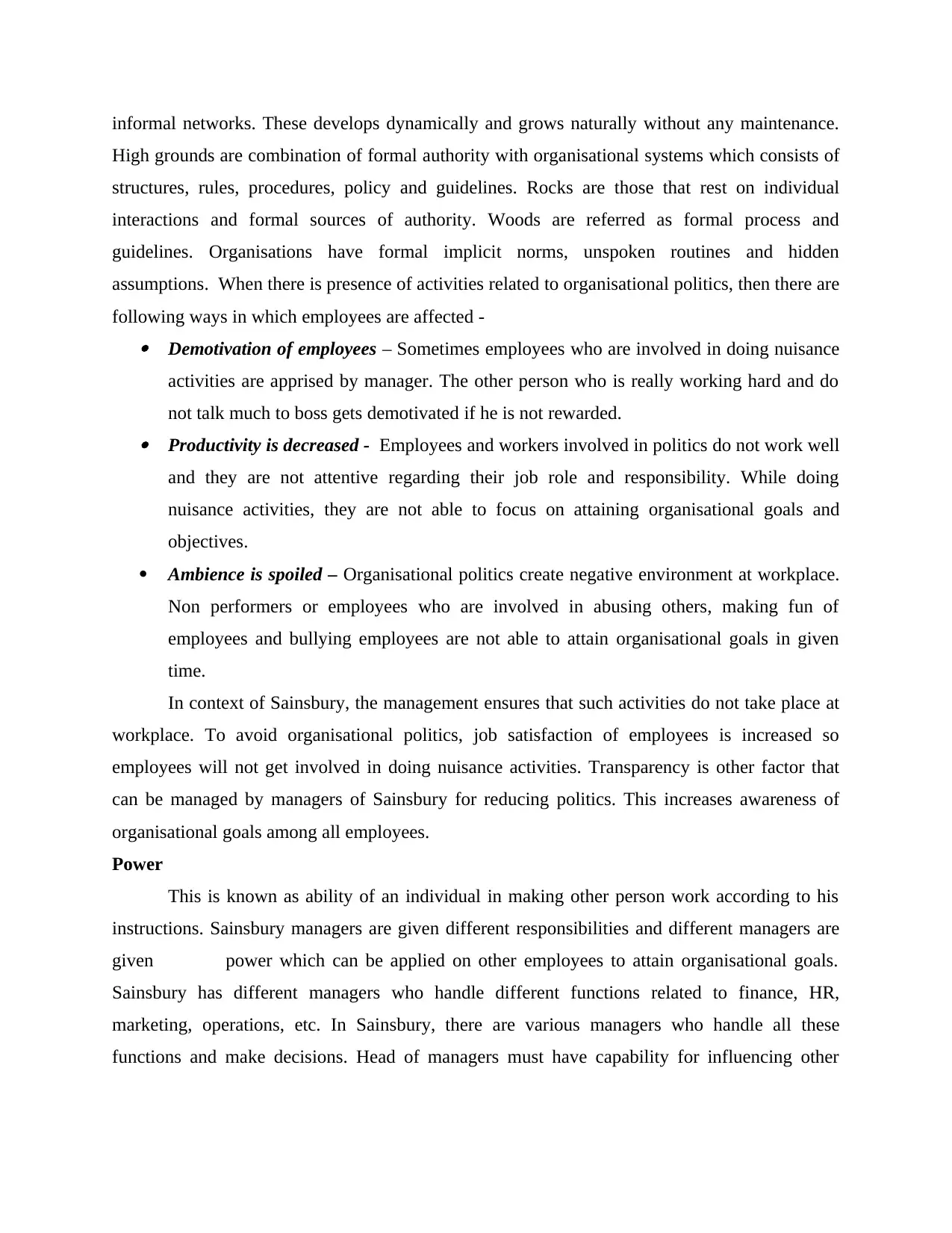
informal networks. These develops dynamically and grows naturally without any maintenance.
High grounds are combination of formal authority with organisational systems which consists of
structures, rules, procedures, policy and guidelines. Rocks are those that rest on individual
interactions and formal sources of authority. Woods are referred as formal process and
guidelines. Organisations have formal implicit norms, unspoken routines and hidden
assumptions. When there is presence of activities related to organisational politics, then there are
following ways in which employees are affected - Demotivation of employees – Sometimes employees who are involved in doing nuisance
activities are apprised by manager. The other person who is really working hard and do
not talk much to boss gets demotivated if he is not rewarded. Productivity is decreased - Employees and workers involved in politics do not work well
and they are not attentive regarding their job role and responsibility. While doing
nuisance activities, they are not able to focus on attaining organisational goals and
objectives.
Ambience is spoiled – Organisational politics create negative environment at workplace.
Non performers or employees who are involved in abusing others, making fun of
employees and bullying employees are not able to attain organisational goals in given
time.
In context of Sainsbury, the management ensures that such activities do not take place at
workplace. To avoid organisational politics, job satisfaction of employees is increased so
employees will not get involved in doing nuisance activities. Transparency is other factor that
can be managed by managers of Sainsbury for reducing politics. This increases awareness of
organisational goals among all employees.
Power
This is known as ability of an individual in making other person work according to his
instructions. Sainsbury managers are given different responsibilities and different managers are
given power which can be applied on other employees to attain organisational goals.
Sainsbury has different managers who handle different functions related to finance, HR,
marketing, operations, etc. In Sainsbury, there are various managers who handle all these
functions and make decisions. Head of managers must have capability for influencing other
High grounds are combination of formal authority with organisational systems which consists of
structures, rules, procedures, policy and guidelines. Rocks are those that rest on individual
interactions and formal sources of authority. Woods are referred as formal process and
guidelines. Organisations have formal implicit norms, unspoken routines and hidden
assumptions. When there is presence of activities related to organisational politics, then there are
following ways in which employees are affected - Demotivation of employees – Sometimes employees who are involved in doing nuisance
activities are apprised by manager. The other person who is really working hard and do
not talk much to boss gets demotivated if he is not rewarded. Productivity is decreased - Employees and workers involved in politics do not work well
and they are not attentive regarding their job role and responsibility. While doing
nuisance activities, they are not able to focus on attaining organisational goals and
objectives.
Ambience is spoiled – Organisational politics create negative environment at workplace.
Non performers or employees who are involved in abusing others, making fun of
employees and bullying employees are not able to attain organisational goals in given
time.
In context of Sainsbury, the management ensures that such activities do not take place at
workplace. To avoid organisational politics, job satisfaction of employees is increased so
employees will not get involved in doing nuisance activities. Transparency is other factor that
can be managed by managers of Sainsbury for reducing politics. This increases awareness of
organisational goals among all employees.
Power
This is known as ability of an individual in making other person work according to his
instructions. Sainsbury managers are given different responsibilities and different managers are
given power which can be applied on other employees to attain organisational goals.
Sainsbury has different managers who handle different functions related to finance, HR,
marketing, operations, etc. In Sainsbury, there are various managers who handle all these
functions and make decisions. Head of managers must have capability for influencing other
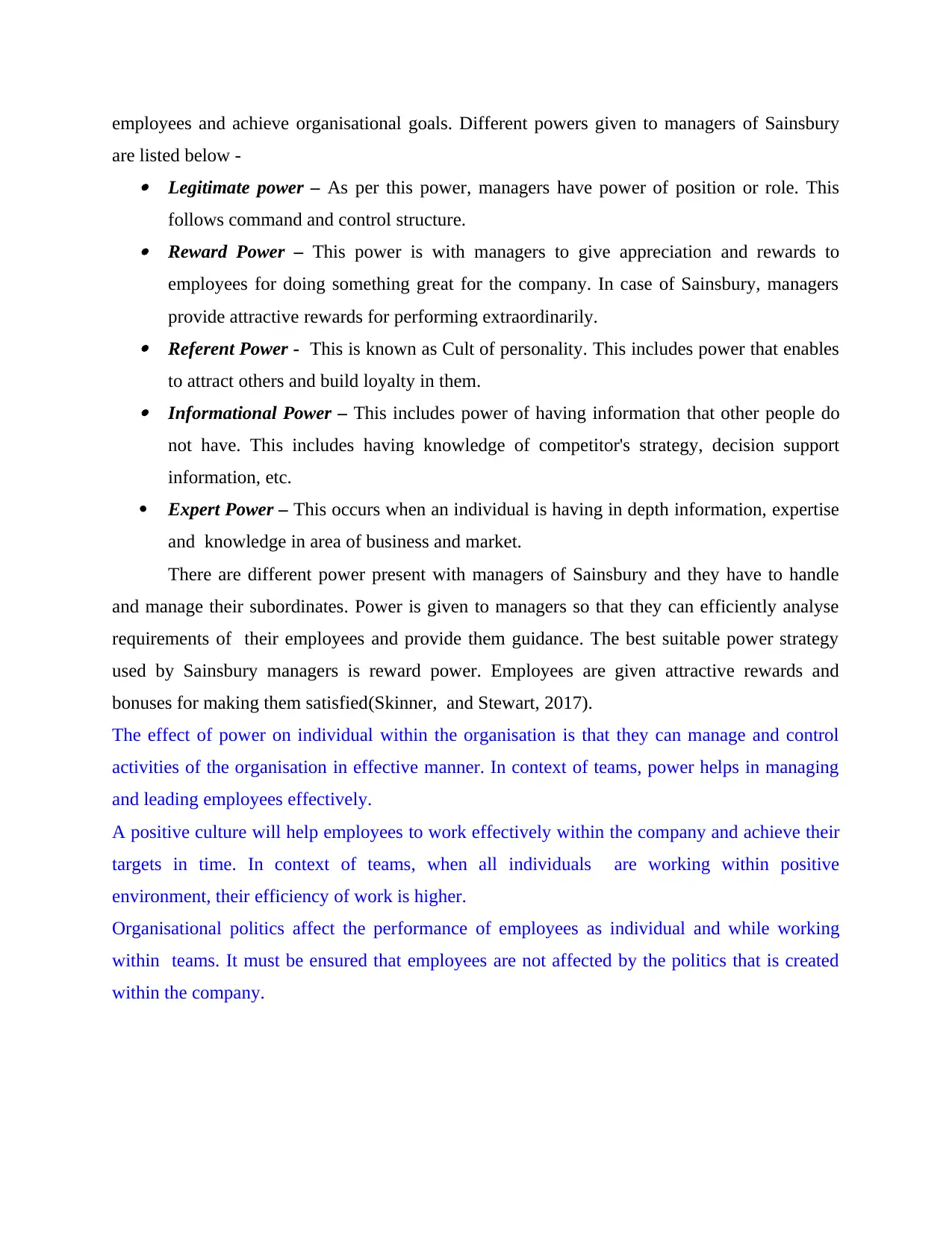
employees and achieve organisational goals. Different powers given to managers of Sainsbury
are listed below - Legitimate power – As per this power, managers have power of position or role. This
follows command and control structure. Reward Power – This power is with managers to give appreciation and rewards to
employees for doing something great for the company. In case of Sainsbury, managers
provide attractive rewards for performing extraordinarily. Referent Power - This is known as Cult of personality. This includes power that enables
to attract others and build loyalty in them. Informational Power – This includes power of having information that other people do
not have. This includes having knowledge of competitor's strategy, decision support
information, etc.
Expert Power – This occurs when an individual is having in depth information, expertise
and knowledge in area of business and market.
There are different power present with managers of Sainsbury and they have to handle
and manage their subordinates. Power is given to managers so that they can efficiently analyse
requirements of their employees and provide them guidance. The best suitable power strategy
used by Sainsbury managers is reward power. Employees are given attractive rewards and
bonuses for making them satisfied(Skinner, and Stewart, 2017).
The effect of power on individual within the organisation is that they can manage and control
activities of the organisation in effective manner. In context of teams, power helps in managing
and leading employees effectively.
A positive culture will help employees to work effectively within the company and achieve their
targets in time. In context of teams, when all individuals are working within positive
environment, their efficiency of work is higher.
Organisational politics affect the performance of employees as individual and while working
within teams. It must be ensured that employees are not affected by the politics that is created
within the company.
are listed below - Legitimate power – As per this power, managers have power of position or role. This
follows command and control structure. Reward Power – This power is with managers to give appreciation and rewards to
employees for doing something great for the company. In case of Sainsbury, managers
provide attractive rewards for performing extraordinarily. Referent Power - This is known as Cult of personality. This includes power that enables
to attract others and build loyalty in them. Informational Power – This includes power of having information that other people do
not have. This includes having knowledge of competitor's strategy, decision support
information, etc.
Expert Power – This occurs when an individual is having in depth information, expertise
and knowledge in area of business and market.
There are different power present with managers of Sainsbury and they have to handle
and manage their subordinates. Power is given to managers so that they can efficiently analyse
requirements of their employees and provide them guidance. The best suitable power strategy
used by Sainsbury managers is reward power. Employees are given attractive rewards and
bonuses for making them satisfied(Skinner, and Stewart, 2017).
The effect of power on individual within the organisation is that they can manage and control
activities of the organisation in effective manner. In context of teams, power helps in managing
and leading employees effectively.
A positive culture will help employees to work effectively within the company and achieve their
targets in time. In context of teams, when all individuals are working within positive
environment, their efficiency of work is higher.
Organisational politics affect the performance of employees as individual and while working
within teams. It must be ensured that employees are not affected by the politics that is created
within the company.
⊘ This is a preview!⊘
Do you want full access?
Subscribe today to unlock all pages.

Trusted by 1+ million students worldwide
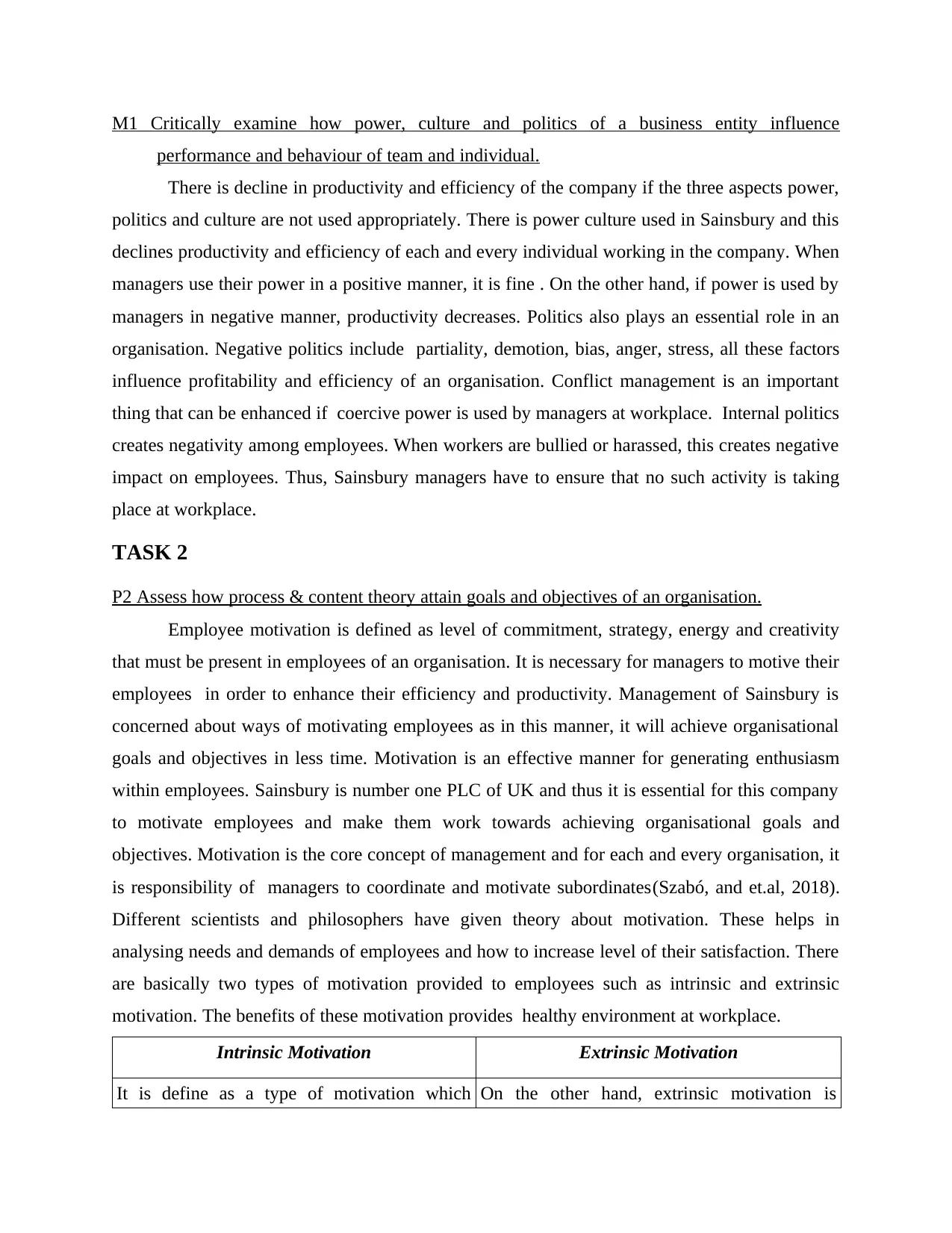
M1 Critically examine how power, culture and politics of a business entity influence
performance and behaviour of team and individual.
There is decline in productivity and efficiency of the company if the three aspects power,
politics and culture are not used appropriately. There is power culture used in Sainsbury and this
declines productivity and efficiency of each and every individual working in the company. When
managers use their power in a positive manner, it is fine . On the other hand, if power is used by
managers in negative manner, productivity decreases. Politics also plays an essential role in an
organisation. Negative politics include partiality, demotion, bias, anger, stress, all these factors
influence profitability and efficiency of an organisation. Conflict management is an important
thing that can be enhanced if coercive power is used by managers at workplace. Internal politics
creates negativity among employees. When workers are bullied or harassed, this creates negative
impact on employees. Thus, Sainsbury managers have to ensure that no such activity is taking
place at workplace.
TASK 2
P2 Assess how process & content theory attain goals and objectives of an organisation.
Employee motivation is defined as level of commitment, strategy, energy and creativity
that must be present in employees of an organisation. It is necessary for managers to motive their
employees in order to enhance their efficiency and productivity. Management of Sainsbury is
concerned about ways of motivating employees as in this manner, it will achieve organisational
goals and objectives in less time. Motivation is an effective manner for generating enthusiasm
within employees. Sainsbury is number one PLC of UK and thus it is essential for this company
to motivate employees and make them work towards achieving organisational goals and
objectives. Motivation is the core concept of management and for each and every organisation, it
is responsibility of managers to coordinate and motivate subordinates(Szabó, and et.al, 2018).
Different scientists and philosophers have given theory about motivation. These helps in
analysing needs and demands of employees and how to increase level of their satisfaction. There
are basically two types of motivation provided to employees such as intrinsic and extrinsic
motivation. The benefits of these motivation provides healthy environment at workplace.
Intrinsic Motivation Extrinsic Motivation
It is define as a type of motivation which On the other hand, extrinsic motivation is
performance and behaviour of team and individual.
There is decline in productivity and efficiency of the company if the three aspects power,
politics and culture are not used appropriately. There is power culture used in Sainsbury and this
declines productivity and efficiency of each and every individual working in the company. When
managers use their power in a positive manner, it is fine . On the other hand, if power is used by
managers in negative manner, productivity decreases. Politics also plays an essential role in an
organisation. Negative politics include partiality, demotion, bias, anger, stress, all these factors
influence profitability and efficiency of an organisation. Conflict management is an important
thing that can be enhanced if coercive power is used by managers at workplace. Internal politics
creates negativity among employees. When workers are bullied or harassed, this creates negative
impact on employees. Thus, Sainsbury managers have to ensure that no such activity is taking
place at workplace.
TASK 2
P2 Assess how process & content theory attain goals and objectives of an organisation.
Employee motivation is defined as level of commitment, strategy, energy and creativity
that must be present in employees of an organisation. It is necessary for managers to motive their
employees in order to enhance their efficiency and productivity. Management of Sainsbury is
concerned about ways of motivating employees as in this manner, it will achieve organisational
goals and objectives in less time. Motivation is an effective manner for generating enthusiasm
within employees. Sainsbury is number one PLC of UK and thus it is essential for this company
to motivate employees and make them work towards achieving organisational goals and
objectives. Motivation is the core concept of management and for each and every organisation, it
is responsibility of managers to coordinate and motivate subordinates(Szabó, and et.al, 2018).
Different scientists and philosophers have given theory about motivation. These helps in
analysing needs and demands of employees and how to increase level of their satisfaction. There
are basically two types of motivation provided to employees such as intrinsic and extrinsic
motivation. The benefits of these motivation provides healthy environment at workplace.
Intrinsic Motivation Extrinsic Motivation
It is define as a type of motivation which On the other hand, extrinsic motivation is
Paraphrase This Document
Need a fresh take? Get an instant paraphrase of this document with our AI Paraphraser
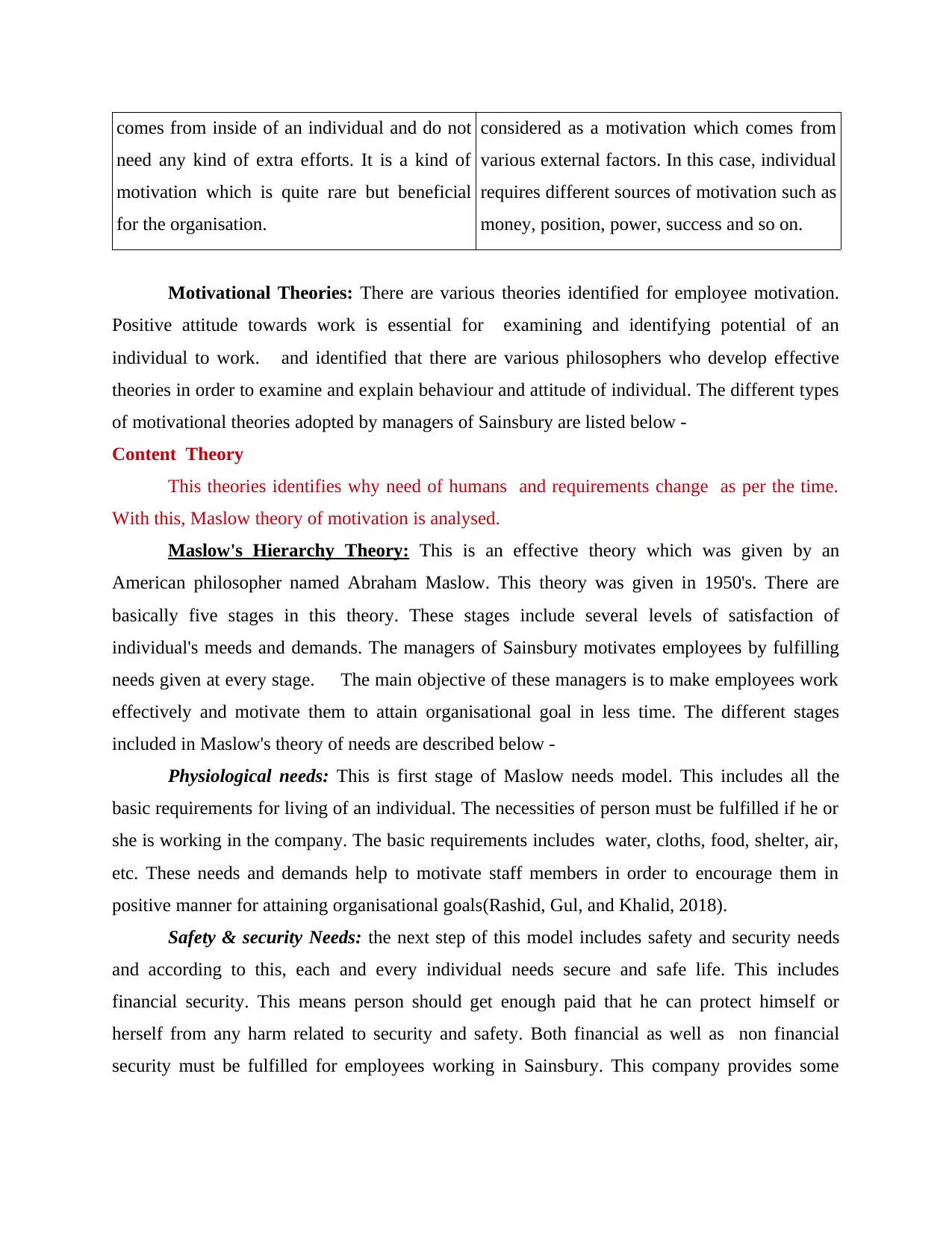
comes from inside of an individual and do not
need any kind of extra efforts. It is a kind of
motivation which is quite rare but beneficial
for the organisation.
considered as a motivation which comes from
various external factors. In this case, individual
requires different sources of motivation such as
money, position, power, success and so on.
Motivational Theories: There are various theories identified for employee motivation.
Positive attitude towards work is essential for examining and identifying potential of an
individual to work. and identified that there are various philosophers who develop effective
theories in order to examine and explain behaviour and attitude of individual. The different types
of motivational theories adopted by managers of Sainsbury are listed below -
Content Theory
This theories identifies why need of humans and requirements change as per the time.
With this, Maslow theory of motivation is analysed.
Maslow's Hierarchy Theory: This is an effective theory which was given by an
American philosopher named Abraham Maslow. This theory was given in 1950's. There are
basically five stages in this theory. These stages include several levels of satisfaction of
individual's meeds and demands. The managers of Sainsbury motivates employees by fulfilling
needs given at every stage. The main objective of these managers is to make employees work
effectively and motivate them to attain organisational goal in less time. The different stages
included in Maslow's theory of needs are described below -
Physiological needs: This is first stage of Maslow needs model. This includes all the
basic requirements for living of an individual. The necessities of person must be fulfilled if he or
she is working in the company. The basic requirements includes water, cloths, food, shelter, air,
etc. These needs and demands help to motivate staff members in order to encourage them in
positive manner for attaining organisational goals(Rashid, Gul, and Khalid, 2018).
Safety & security Needs: the next step of this model includes safety and security needs
and according to this, each and every individual needs secure and safe life. This includes
financial security. This means person should get enough paid that he can protect himself or
herself from any harm related to security and safety. Both financial as well as non financial
security must be fulfilled for employees working in Sainsbury. This company provides some
need any kind of extra efforts. It is a kind of
motivation which is quite rare but beneficial
for the organisation.
considered as a motivation which comes from
various external factors. In this case, individual
requires different sources of motivation such as
money, position, power, success and so on.
Motivational Theories: There are various theories identified for employee motivation.
Positive attitude towards work is essential for examining and identifying potential of an
individual to work. and identified that there are various philosophers who develop effective
theories in order to examine and explain behaviour and attitude of individual. The different types
of motivational theories adopted by managers of Sainsbury are listed below -
Content Theory
This theories identifies why need of humans and requirements change as per the time.
With this, Maslow theory of motivation is analysed.
Maslow's Hierarchy Theory: This is an effective theory which was given by an
American philosopher named Abraham Maslow. This theory was given in 1950's. There are
basically five stages in this theory. These stages include several levels of satisfaction of
individual's meeds and demands. The managers of Sainsbury motivates employees by fulfilling
needs given at every stage. The main objective of these managers is to make employees work
effectively and motivate them to attain organisational goal in less time. The different stages
included in Maslow's theory of needs are described below -
Physiological needs: This is first stage of Maslow needs model. This includes all the
basic requirements for living of an individual. The necessities of person must be fulfilled if he or
she is working in the company. The basic requirements includes water, cloths, food, shelter, air,
etc. These needs and demands help to motivate staff members in order to encourage them in
positive manner for attaining organisational goals(Rashid, Gul, and Khalid, 2018).
Safety & security Needs: the next step of this model includes safety and security needs
and according to this, each and every individual needs secure and safe life. This includes
financial security. This means person should get enough paid that he can protect himself or
herself from any harm related to security and safety. Both financial as well as non financial
security must be fulfilled for employees working in Sainsbury. This company provides some
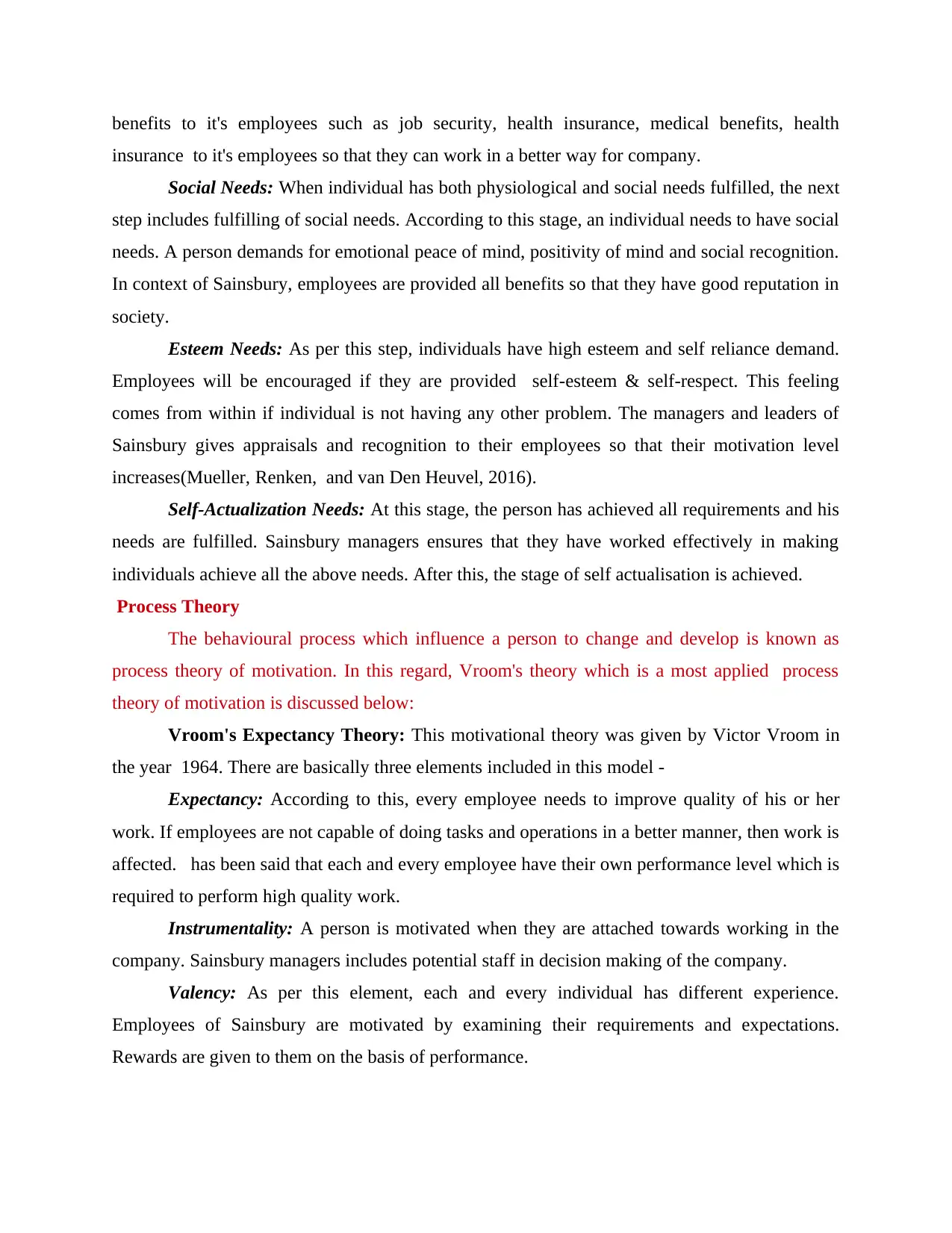
benefits to it's employees such as job security, health insurance, medical benefits, health
insurance to it's employees so that they can work in a better way for company.
Social Needs: When individual has both physiological and social needs fulfilled, the next
step includes fulfilling of social needs. According to this stage, an individual needs to have social
needs. A person demands for emotional peace of mind, positivity of mind and social recognition.
In context of Sainsbury, employees are provided all benefits so that they have good reputation in
society.
Esteem Needs: As per this step, individuals have high esteem and self reliance demand.
Employees will be encouraged if they are provided self-esteem & self-respect. This feeling
comes from within if individual is not having any other problem. The managers and leaders of
Sainsbury gives appraisals and recognition to their employees so that their motivation level
increases(Mueller, Renken, and van Den Heuvel, 2016).
Self-Actualization Needs: At this stage, the person has achieved all requirements and his
needs are fulfilled. Sainsbury managers ensures that they have worked effectively in making
individuals achieve all the above needs. After this, the stage of self actualisation is achieved.
Process Theory
The behavioural process which influence a person to change and develop is known as
process theory of motivation. In this regard, Vroom's theory which is a most applied process
theory of motivation is discussed below:
Vroom's Expectancy Theory: This motivational theory was given by Victor Vroom in
the year 1964. There are basically three elements included in this model -
Expectancy: According to this, every employee needs to improve quality of his or her
work. If employees are not capable of doing tasks and operations in a better manner, then work is
affected. has been said that each and every employee have their own performance level which is
required to perform high quality work.
Instrumentality: A person is motivated when they are attached towards working in the
company. Sainsbury managers includes potential staff in decision making of the company.
Valency: As per this element, each and every individual has different experience.
Employees of Sainsbury are motivated by examining their requirements and expectations.
Rewards are given to them on the basis of performance.
insurance to it's employees so that they can work in a better way for company.
Social Needs: When individual has both physiological and social needs fulfilled, the next
step includes fulfilling of social needs. According to this stage, an individual needs to have social
needs. A person demands for emotional peace of mind, positivity of mind and social recognition.
In context of Sainsbury, employees are provided all benefits so that they have good reputation in
society.
Esteem Needs: As per this step, individuals have high esteem and self reliance demand.
Employees will be encouraged if they are provided self-esteem & self-respect. This feeling
comes from within if individual is not having any other problem. The managers and leaders of
Sainsbury gives appraisals and recognition to their employees so that their motivation level
increases(Mueller, Renken, and van Den Heuvel, 2016).
Self-Actualization Needs: At this stage, the person has achieved all requirements and his
needs are fulfilled. Sainsbury managers ensures that they have worked effectively in making
individuals achieve all the above needs. After this, the stage of self actualisation is achieved.
Process Theory
The behavioural process which influence a person to change and develop is known as
process theory of motivation. In this regard, Vroom's theory which is a most applied process
theory of motivation is discussed below:
Vroom's Expectancy Theory: This motivational theory was given by Victor Vroom in
the year 1964. There are basically three elements included in this model -
Expectancy: According to this, every employee needs to improve quality of his or her
work. If employees are not capable of doing tasks and operations in a better manner, then work is
affected. has been said that each and every employee have their own performance level which is
required to perform high quality work.
Instrumentality: A person is motivated when they are attached towards working in the
company. Sainsbury managers includes potential staff in decision making of the company.
Valency: As per this element, each and every individual has different experience.
Employees of Sainsbury are motivated by examining their requirements and expectations.
Rewards are given to them on the basis of performance.
⊘ This is a preview!⊘
Do you want full access?
Subscribe today to unlock all pages.

Trusted by 1+ million students worldwide
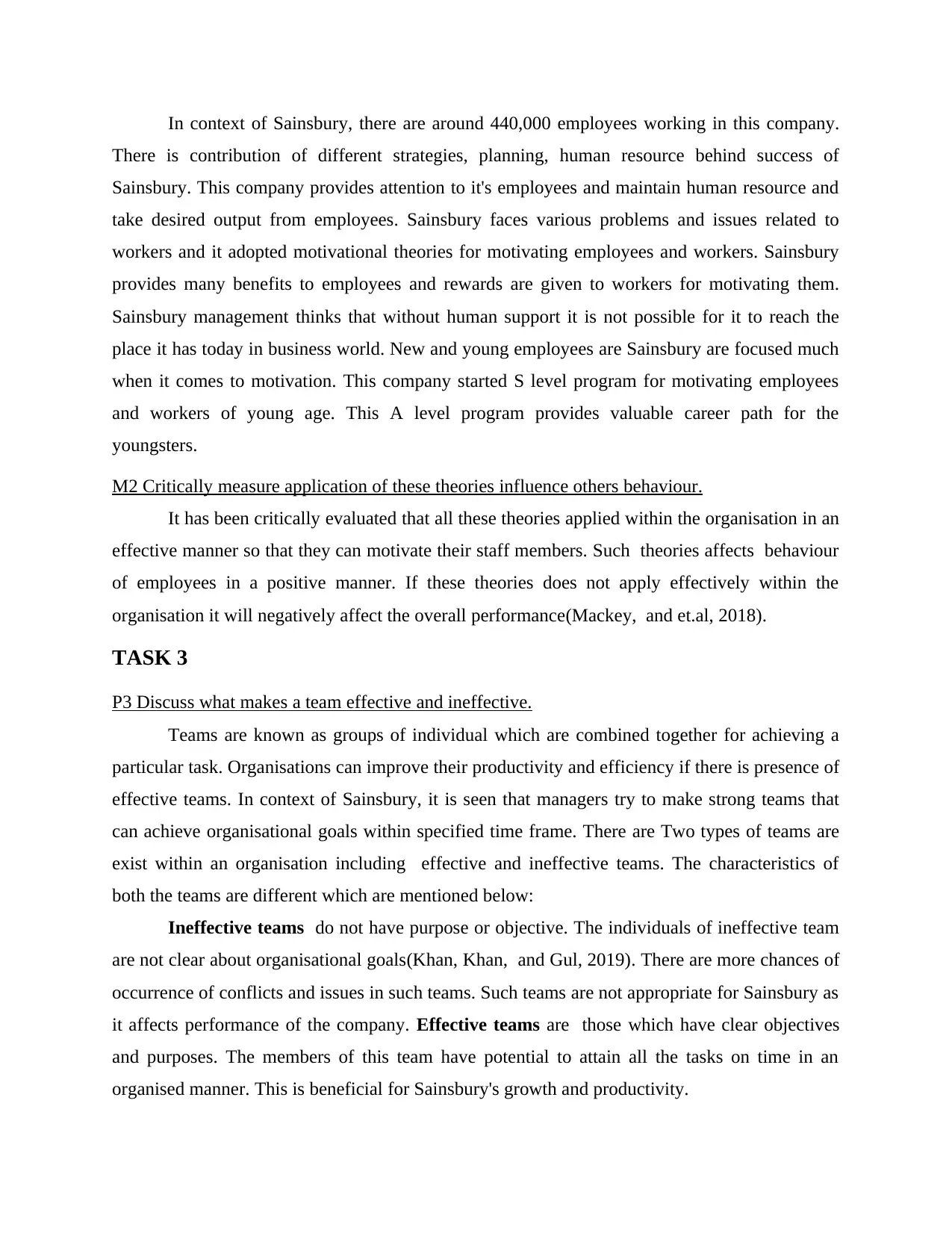
In context of Sainsbury, there are around 440,000 employees working in this company.
There is contribution of different strategies, planning, human resource behind success of
Sainsbury. This company provides attention to it's employees and maintain human resource and
take desired output from employees. Sainsbury faces various problems and issues related to
workers and it adopted motivational theories for motivating employees and workers. Sainsbury
provides many benefits to employees and rewards are given to workers for motivating them.
Sainsbury management thinks that without human support it is not possible for it to reach the
place it has today in business world. New and young employees are Sainsbury are focused much
when it comes to motivation. This company started S level program for motivating employees
and workers of young age. This A level program provides valuable career path for the
youngsters.
M2 Critically measure application of these theories influence others behaviour.
It has been critically evaluated that all these theories applied within the organisation in an
effective manner so that they can motivate their staff members. Such theories affects behaviour
of employees in a positive manner. If these theories does not apply effectively within the
organisation it will negatively affect the overall performance(Mackey, and et.al, 2018).
TASK 3
P3 Discuss what makes a team effective and ineffective.
Teams are known as groups of individual which are combined together for achieving a
particular task. Organisations can improve their productivity and efficiency if there is presence of
effective teams. In context of Sainsbury, it is seen that managers try to make strong teams that
can achieve organisational goals within specified time frame. There are Two types of teams are
exist within an organisation including effective and ineffective teams. The characteristics of
both the teams are different which are mentioned below:
Ineffective teams do not have purpose or objective. The individuals of ineffective team
are not clear about organisational goals(Khan, Khan, and Gul, 2019). There are more chances of
occurrence of conflicts and issues in such teams. Such teams are not appropriate for Sainsbury as
it affects performance of the company. Effective teams are those which have clear objectives
and purposes. The members of this team have potential to attain all the tasks on time in an
organised manner. This is beneficial for Sainsbury's growth and productivity.
There is contribution of different strategies, planning, human resource behind success of
Sainsbury. This company provides attention to it's employees and maintain human resource and
take desired output from employees. Sainsbury faces various problems and issues related to
workers and it adopted motivational theories for motivating employees and workers. Sainsbury
provides many benefits to employees and rewards are given to workers for motivating them.
Sainsbury management thinks that without human support it is not possible for it to reach the
place it has today in business world. New and young employees are Sainsbury are focused much
when it comes to motivation. This company started S level program for motivating employees
and workers of young age. This A level program provides valuable career path for the
youngsters.
M2 Critically measure application of these theories influence others behaviour.
It has been critically evaluated that all these theories applied within the organisation in an
effective manner so that they can motivate their staff members. Such theories affects behaviour
of employees in a positive manner. If these theories does not apply effectively within the
organisation it will negatively affect the overall performance(Mackey, and et.al, 2018).
TASK 3
P3 Discuss what makes a team effective and ineffective.
Teams are known as groups of individual which are combined together for achieving a
particular task. Organisations can improve their productivity and efficiency if there is presence of
effective teams. In context of Sainsbury, it is seen that managers try to make strong teams that
can achieve organisational goals within specified time frame. There are Two types of teams are
exist within an organisation including effective and ineffective teams. The characteristics of
both the teams are different which are mentioned below:
Ineffective teams do not have purpose or objective. The individuals of ineffective team
are not clear about organisational goals(Khan, Khan, and Gul, 2019). There are more chances of
occurrence of conflicts and issues in such teams. Such teams are not appropriate for Sainsbury as
it affects performance of the company. Effective teams are those which have clear objectives
and purposes. The members of this team have potential to attain all the tasks on time in an
organised manner. This is beneficial for Sainsbury's growth and productivity.
Paraphrase This Document
Need a fresh take? Get an instant paraphrase of this document with our AI Paraphraser
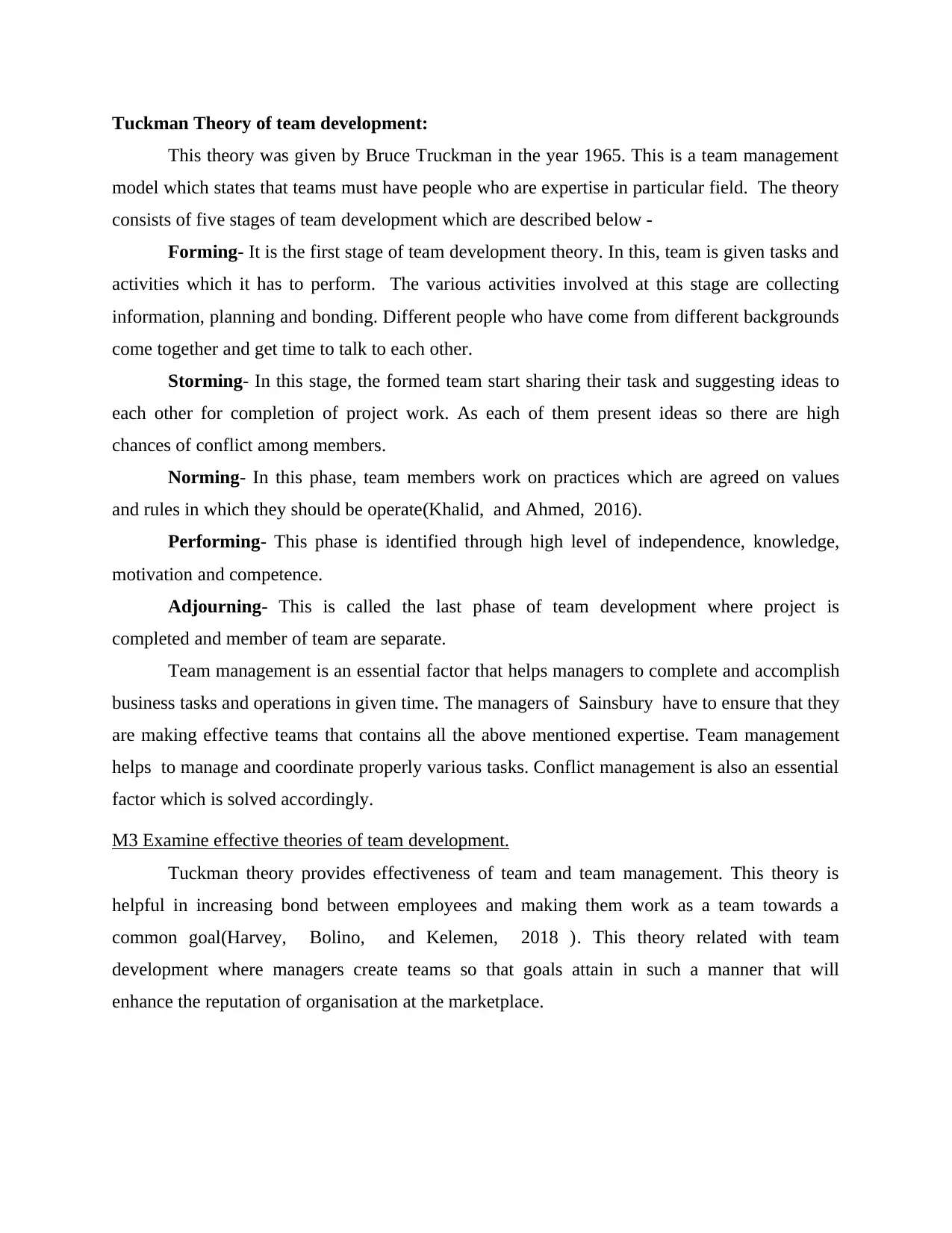
Tuckman Theory of team development:
This theory was given by Bruce Truckman in the year 1965. This is a team management
model which states that teams must have people who are expertise in particular field. The theory
consists of five stages of team development which are described below -
Forming- It is the first stage of team development theory. In this, team is given tasks and
activities which it has to perform. The various activities involved at this stage are collecting
information, planning and bonding. Different people who have come from different backgrounds
come together and get time to talk to each other.
Storming- In this stage, the formed team start sharing their task and suggesting ideas to
each other for completion of project work. As each of them present ideas so there are high
chances of conflict among members.
Norming- In this phase, team members work on practices which are agreed on values
and rules in which they should be operate(Khalid, and Ahmed, 2016).
Performing- This phase is identified through high level of independence, knowledge,
motivation and competence.
Adjourning- This is called the last phase of team development where project is
completed and member of team are separate.
Team management is an essential factor that helps managers to complete and accomplish
business tasks and operations in given time. The managers of Sainsbury have to ensure that they
are making effective teams that contains all the above mentioned expertise. Team management
helps to manage and coordinate properly various tasks. Conflict management is also an essential
factor which is solved accordingly.
M3 Examine effective theories of team development.
Tuckman theory provides effectiveness of team and team management. This theory is
helpful in increasing bond between employees and making them work as a team towards a
common goal(Harvey, Bolino, and Kelemen, 2018 ). This theory related with team
development where managers create teams so that goals attain in such a manner that will
enhance the reputation of organisation at the marketplace.
This theory was given by Bruce Truckman in the year 1965. This is a team management
model which states that teams must have people who are expertise in particular field. The theory
consists of five stages of team development which are described below -
Forming- It is the first stage of team development theory. In this, team is given tasks and
activities which it has to perform. The various activities involved at this stage are collecting
information, planning and bonding. Different people who have come from different backgrounds
come together and get time to talk to each other.
Storming- In this stage, the formed team start sharing their task and suggesting ideas to
each other for completion of project work. As each of them present ideas so there are high
chances of conflict among members.
Norming- In this phase, team members work on practices which are agreed on values
and rules in which they should be operate(Khalid, and Ahmed, 2016).
Performing- This phase is identified through high level of independence, knowledge,
motivation and competence.
Adjourning- This is called the last phase of team development where project is
completed and member of team are separate.
Team management is an essential factor that helps managers to complete and accomplish
business tasks and operations in given time. The managers of Sainsbury have to ensure that they
are making effective teams that contains all the above mentioned expertise. Team management
helps to manage and coordinate properly various tasks. Conflict management is also an essential
factor which is solved accordingly.
M3 Examine effective theories of team development.
Tuckman theory provides effectiveness of team and team management. This theory is
helpful in increasing bond between employees and making them work as a team towards a
common goal(Harvey, Bolino, and Kelemen, 2018 ). This theory related with team
development where managers create teams so that goals attain in such a manner that will
enhance the reputation of organisation at the marketplace.
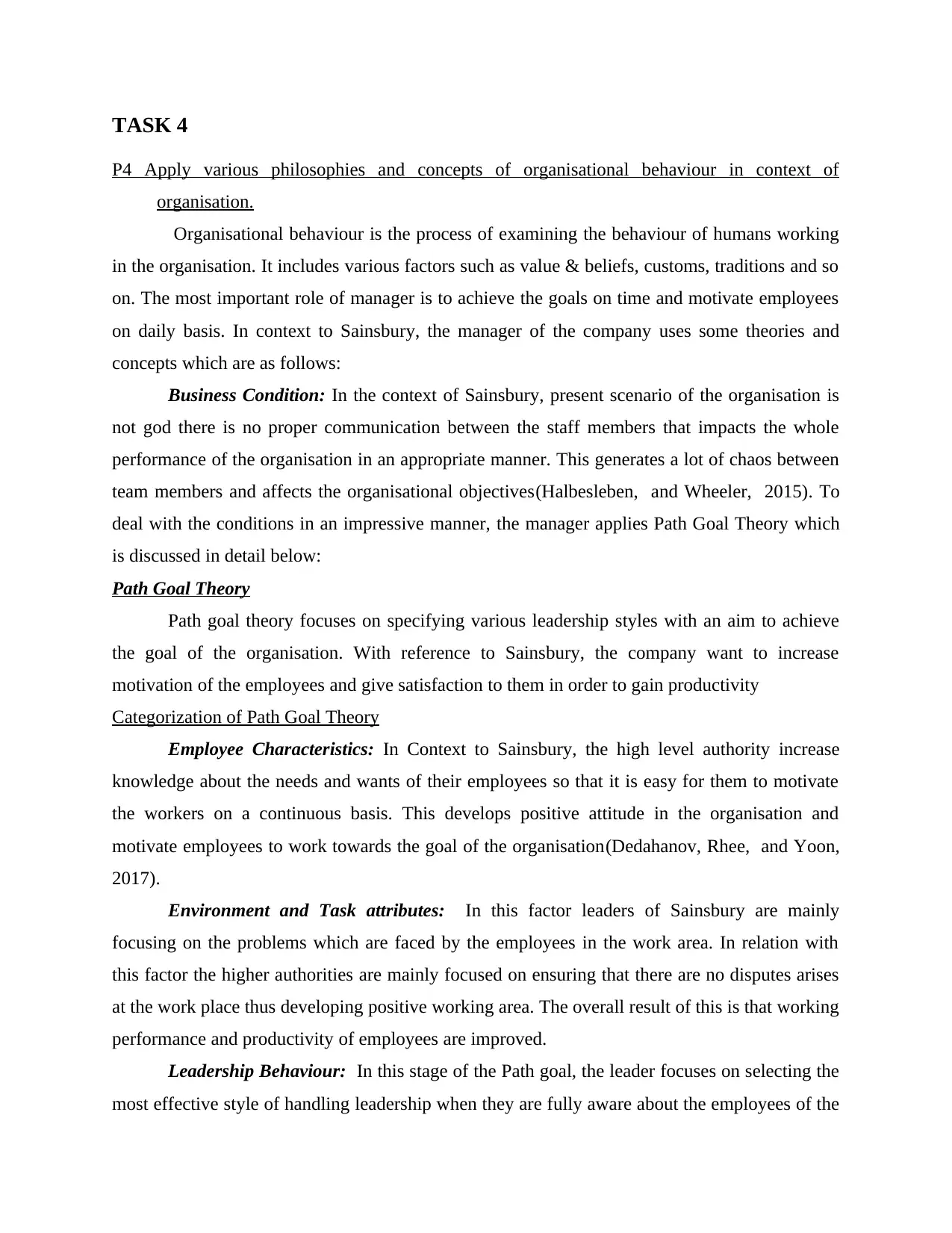
TASK 4
P4 Apply various philosophies and concepts of organisational behaviour in context of
organisation.
Organisational behaviour is the process of examining the behaviour of humans working
in the organisation. It includes various factors such as value & beliefs, customs, traditions and so
on. The most important role of manager is to achieve the goals on time and motivate employees
on daily basis. In context to Sainsbury, the manager of the company uses some theories and
concepts which are as follows:
Business Condition: In the context of Sainsbury, present scenario of the organisation is
not god there is no proper communication between the staff members that impacts the whole
performance of the organisation in an appropriate manner. This generates a lot of chaos between
team members and affects the organisational objectives(Halbesleben, and Wheeler, 2015). To
deal with the conditions in an impressive manner, the manager applies Path Goal Theory which
is discussed in detail below:
Path Goal Theory
Path goal theory focuses on specifying various leadership styles with an aim to achieve
the goal of the organisation. With reference to Sainsbury, the company want to increase
motivation of the employees and give satisfaction to them in order to gain productivity
Categorization of Path Goal Theory
Employee Characteristics: In Context to Sainsbury, the high level authority increase
knowledge about the needs and wants of their employees so that it is easy for them to motivate
the workers on a continuous basis. This develops positive attitude in the organisation and
motivate employees to work towards the goal of the organisation(Dedahanov, Rhee, and Yoon,
2017).
Environment and Task attributes: In this factor leaders of Sainsbury are mainly
focusing on the problems which are faced by the employees in the work area. In relation with
this factor the higher authorities are mainly focused on ensuring that there are no disputes arises
at the work place thus developing positive working area. The overall result of this is that working
performance and productivity of employees are improved.
Leadership Behaviour: In this stage of the Path goal, the leader focuses on selecting the
most effective style of handling leadership when they are fully aware about the employees of the
P4 Apply various philosophies and concepts of organisational behaviour in context of
organisation.
Organisational behaviour is the process of examining the behaviour of humans working
in the organisation. It includes various factors such as value & beliefs, customs, traditions and so
on. The most important role of manager is to achieve the goals on time and motivate employees
on daily basis. In context to Sainsbury, the manager of the company uses some theories and
concepts which are as follows:
Business Condition: In the context of Sainsbury, present scenario of the organisation is
not god there is no proper communication between the staff members that impacts the whole
performance of the organisation in an appropriate manner. This generates a lot of chaos between
team members and affects the organisational objectives(Halbesleben, and Wheeler, 2015). To
deal with the conditions in an impressive manner, the manager applies Path Goal Theory which
is discussed in detail below:
Path Goal Theory
Path goal theory focuses on specifying various leadership styles with an aim to achieve
the goal of the organisation. With reference to Sainsbury, the company want to increase
motivation of the employees and give satisfaction to them in order to gain productivity
Categorization of Path Goal Theory
Employee Characteristics: In Context to Sainsbury, the high level authority increase
knowledge about the needs and wants of their employees so that it is easy for them to motivate
the workers on a continuous basis. This develops positive attitude in the organisation and
motivate employees to work towards the goal of the organisation(Dedahanov, Rhee, and Yoon,
2017).
Environment and Task attributes: In this factor leaders of Sainsbury are mainly
focusing on the problems which are faced by the employees in the work area. In relation with
this factor the higher authorities are mainly focused on ensuring that there are no disputes arises
at the work place thus developing positive working area. The overall result of this is that working
performance and productivity of employees are improved.
Leadership Behaviour: In this stage of the Path goal, the leader focuses on selecting the
most effective style of handling leadership when they are fully aware about the employees of the
⊘ This is a preview!⊘
Do you want full access?
Subscribe today to unlock all pages.

Trusted by 1+ million students worldwide
1 out of 15
Related Documents
Your All-in-One AI-Powered Toolkit for Academic Success.
+13062052269
info@desklib.com
Available 24*7 on WhatsApp / Email
![[object Object]](/_next/static/media/star-bottom.7253800d.svg)
Unlock your academic potential
Copyright © 2020–2026 A2Z Services. All Rights Reserved. Developed and managed by ZUCOL.



